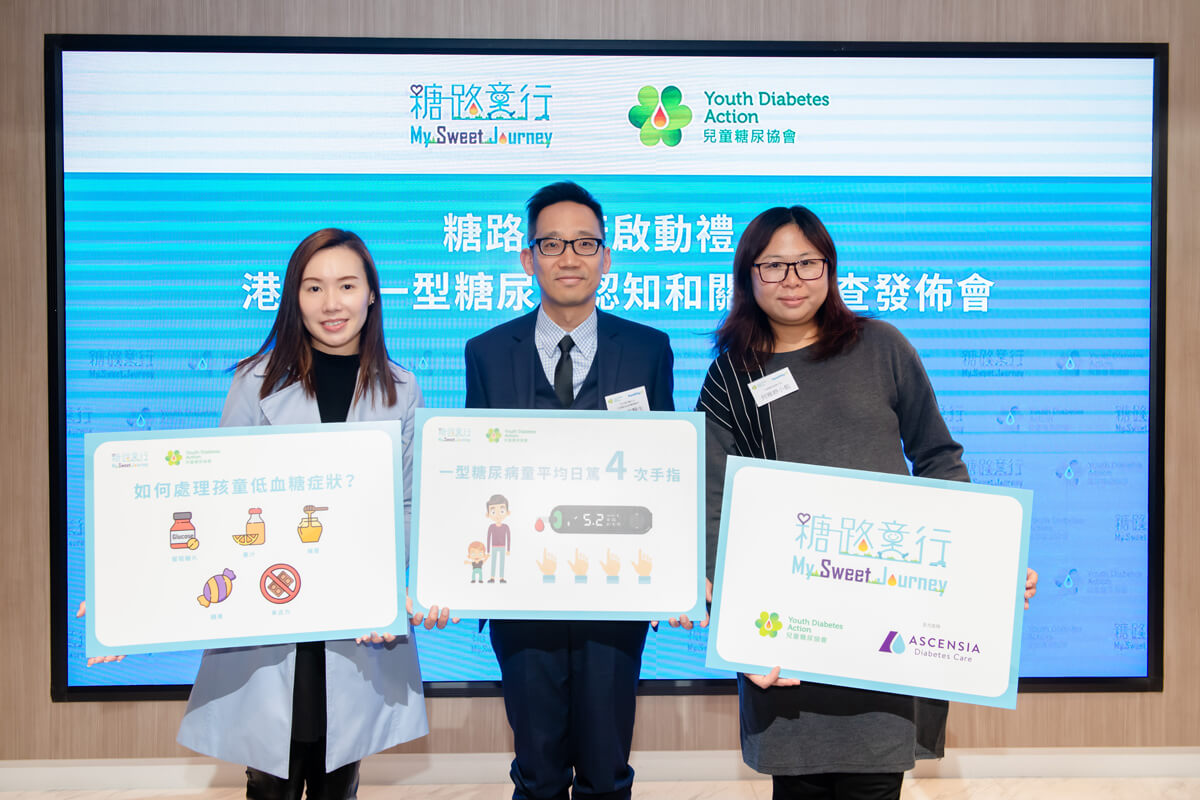healthyD & YDA Jointly Announce Survey Results on Social Knowledge & Awareness of Type 1 Diabetes of Hong Kong

healthyD & Youth Diabetes Action announce results on
Social Knowledge & Awareness of Type 1 Diabetes of Hong Kong Survey
- Child patients’ insignificant diabetes symptoms easily be overlooked by family
- 70% child patients suffered from hypoglycemia and multiple measurements in daily blood glucose levels
- Enhanced social communication essential to eliminate insufficiency of patient and family support
[Hong Kong – 2nd December, 2019] Unlike type 2 diabetes (T2D), type 1 diabetes (T1D) is a less common form of diabetes that Hong Kong community is less aware of. Addressing on the lack of social attention and support among local T1D patients and their families, the Social Knowledge & Awareness of Type 1 Diabetes of Hong Kong Survey was conducted in September 2019 by healthyD (www.healthyd.com), a health and wellness media platform of ESDlife. In collaboration with Youth Diabetes Action (YDA) (www.yda.org.hk), online and paper questionnaires were distributed to families of T1D patients through its network. 1,156 citizens and 156 family members of T1D patients were interviewed in this survey, aiming to take an overview on T1D in Hong Kong and social knowledge on the disease for raising community awareness of disease patients and enhancing mutual assistance.
T1D unfamiliarity surfaces: over half failed to distinguish and near one-third thought the disease is curable
Diabetes is mainly divided into T1D and T2D. While over 70% of respondents knew that diabetes exists in more than one form, over half (54%) of respondents failed to distinguish T1D and T2D. The difference between T1D and the more popular T2D is that the former is an autoimmune disorder that often strikes the patients since their childhood and adolescence. As immune system abnormally attacks pancreas, patients are unable to control the blood sugar level, and their pancreas will eventually stop producing insulin. Unfortunately, nearly half (49%) of respondents mistakenly believed that T1D can be treated by medical alternatives other than insulin injection, while two out of five thought oral medication can be applied to the disease.
In addition, local community generally misunderstands the nature of T1D, assuming that T1D patients are those who regularly consume excessive sugar or sugary foods (24%), adopt indulgent diet and are lack of exercise (21%), or are prone to obesity (9%). Coupled with misconceptions that nearly three-fifth (57%) and over one-third (34%) of respondents believed T1D is preventable and curable, respective, it is essential to enhance the public understanding on the disease from now.
Insufficient social information highlighted by mix-up of hyperglycemia and hypoglycemia among two-fifth of Hong Kong people
According to the survey, over two-fifth (44%) of respondents were unaware of hyperglycemia and hypoglycemia suffered by T1D patients and failed to identify the causes of respective conditions. For instance, over seven-tenth (72%) of respondents mistakenly believed hyperglycemia can be caused by overeating candy, while nearly one-fifth (19%) thought hypoglycemia is the result of not eating candies or chocolate. These reflect the insufficient social information on T1D educating the community on the importance of blood sugar management and monitoring. Occurrence of hypoglycemia or hyperglycemia can lead to acute complications resulting in loss of consciousness or coma, or even be a fatal cause in severe case. It is therefore essential to encouraging the public to stay alert on T1D.
Misunderstanding on chocolate as a cure for hypoglycemia hinders treatment and increases health risks
Hypoglycemia is among the common symptoms of TID, by which patients are prone to dizziness and may even faint in severe case. However, eating chocolate is still considered as a way to stabilise blood sugar level by nearly two-fifth (37%) of respondents. Commenting on the confusion, Dr. Wong Wai Chun, Sammy, Specialist in Paediatrics and Medical Advisor of YDA, stated, “Chocolate is not an appropriate food for managing acute hypoglycemia. As its ingredients contain a lot of fat, it delays sugar absorption from our body and is counterproductive to relieving hypoglycemic symptoms. It is recommended to take candies (e.g. glucose tablets) or sugary drinks (e.g. fruit juices) directly for better treatment.”
T1D onset peaks between 6 to 11 years of age; seven-tenth child patients suffered from hypoglycemia and multiple measurements in daily blood glucose levels
The survey revealed that the majority of T1D onset triggered before adulthood, with 6 to 11 years of age as the most frequent onset period (44%). In terms of daily glucose monitoring, the average measurement of T1D child patients is 4.1 times per day, and nearly one-tenth (9%) require no less than 7 glucose measurements in a daily basis. Meanwhile, T1D child patients receive an average of 3.7 insulin injections per day. The more worrying findings are that over seven-tenth child patients (72%) experienced hypoglycemia in midnights, and virtually all (95%) suffered 1 to 3 times per week.
Insignificant diabetes symptoms easily be overlooked by family
Almost nine-tenth (86%) of respondents did not realise that sudden bedwetting is among the symptoms of T1D. In others words, common childhood condition like childhood bedwetting should never be taken lightly by parents; if they overlook any potential T1D signal, their children may miss the best chance to initiate treatment. Dr. Wong said, “In general, about 15% of 5-year-old and 5% of 10-year-old children have bedwetting conditions. There are numerous causes of bedwetting ranging from maturational delay, diabetes, hormonal imbalance, urinary tract infection or even psychological factors. Should there be any abnormalities like sudden onset of bedwetting, presence of urinary symptom in the daytime, or even persistent bedwetting in adolescence, parents should seek for medical advice in due course. Urine test and other basic investigations can help to identify the cause of bedwetting and find out if children are suffering from T1D.”
Families worried on child patients to integrate into campus life and called for home-school cooperation for equal opportunities
Mostly diagnosed at a relatively young age, T1D child patients generally do not understand what has happened and feel puzzled on their health. Among the examples are daily inconvenience due to regular glucose monitoring and insulin injection (92%), limitations to participate in preferred activities (67%) and drawing inquisitive stares from others (35%). It is natural from parents of T1D child patients calling for home-school cooperation to ensure their child patients can inject insulin in a safe place within the campus and on time (85%), so as to maintain close communication with parents (79%). At the same time, parents are eager to see their children’s classmates and peers have a better understanding on diabetes (82%), and offering support and encouragement (75%).
Families of T1D child patients expect arousing social awareness and enhanced support to ease their helpless feeling
When their children are diagnosed with T1D, parents feel worried or puzzled (65%), sad and helpless (62%), and even address the economic pressure (46%) (see Appendix – Figure 1). Added to the survey findings in that over one-tenth (14%) of parents were not intended to share their cases with others because they would not receive any support after sharing (68%) and try to avoid the inquisitive stares on their children from others (45%). Ms. Anty Ho, Representative of YDA, said, “Once a child is diagnosed with T1D, his or her family will immediately feel helpless and worried. Therefore, YDA aims at providing support of care, financial and medical to the needy families through counselling, sharing and activities, ensuring that they will receive appropriate assistance and support”.
Appendix
Figure 1: Parents’ feelings about their children as T1D patients
| Feeling(s) (multiple options) | Percentage |
| Worried / puzzled | 65% |
| Sad and helpless | 62% |
| Feel the economic pressure | 46% |
| Self-blaming | 34% |
| Tired | 17% |
| Embarrassed / low self-esteem | 10% |
Photo Caption



– End –
About ESDlife & healthyD
ESDlife, a joint venture of CK Hutchison (formerly Hutchison Whampoa) and Hewlett-Packard HKSAR, operates the award-winning website (www.esdlife.com) and establishes it as one of the most popular and trusted online lifestyle media in Hong Kong. The online platform of ESDlife is furnished with a wide range of lifestyles information under the categories of Wedding, Family and Health. In addition to the prominent No. 1 position of its Wedding Channel in Hong Kong, an e-commerce platform is provided to consumers by offering medical check-up ordering services. ESDlife also delivers integrated marketing and digital solutions to diversified corporate clients. healthyD (www.healthyD.com) is one of the media platforms of ESDlife. It is now the largest online interactive platform for healthy living in Hong Kong, offering a wealth of health and wellness information including nutritional menus, diet tips, encyclopedia of lifestyle disease, sports and fitness, emotional management and green living to boost your healthy and happy living.
嘉賓出席「港人衛生意識及皮膚健康調查」結果發布會-1-149x108.jpg)

